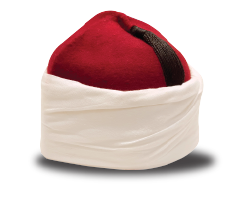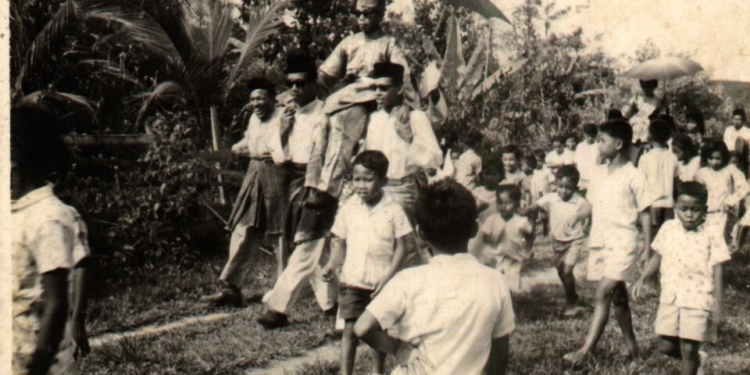Memoir Eng
Chapter 9: Bekwoh in Tranung
Marriage is the sunnah of Rasullullah PBUH and sanctioned in the Quran and hadith, it is an innate desire in humans to build a whole and happy life. To get the best marriage one must first analyze the following matters:
- Set the intention for the sole sake of Allah which is building a household that practices Islamic teachings, gives birth to a good lineage that is capable to carry the responsibility and realize the effort in ensuring the continuous guidance of Allah SWT to be spread all around the world.
- Take care of one’s views, dignity and increasing one’s taqwa to Allah SWT.
- Choose the best characteristics for one’s wife and life’s partner.
- Choose a wife who has commendable character and religion even if she does not own wealth or beauty.
The Prophet PBUH said:
فَاظْفَرْ بِذَاتِ الدِّينِ تَرِبَتْ يَدَاكَ
“So, get the one who is religious and prosper.” [1]
Al-Ḥāfiẓ Ibn Ḥajar explained, the phrase “فَاظْفَرْ بِذَاتِ الدِّينِ” means a religious person who honours his dignity (character and conduct) should make religion as his guidance in every matter, especially in the matters of choosing his partner where he will spend the rest of his life with (wife). Hence, the Prophet PBUH commanded a man to choose a woman who has religion whereby religion should be the pinnacle of his desire. [2]
Imam al-Nawawī stated that the above hadith detailed the usual custom as to the matters a person will take into consideration when he wants to marry a woman, there are basically four matters, and Rasullullah asked us to consider her religion for it will benefit us in this world and the hereafter. [3]
The phrase “فَاظْفَرْ” means to find or try or strive to get a good woman with a great religion. [4]
Imam al-San’ani said the Prophet PBUH instructed men of whom if they have a woman whose religion is good to never change their choice to another woman. [5]
The author of al-Fiqh al-Manhaji stated: “The wisdom of choosing a woman with great religion is so that the religion could continue to be fortified together throughout time. While one’s character could continue to improve with each passing day, creating new life experiences. When each couple makes religion and character as the basis in making a choice, it would guarantee the growth of everlasting love and care.”
This does not mean that people should completely disregard other factors such as lineage and beauty. Consequently, it means that if a woman only has certain characteristics, then one should choose a woman with great religion. If she possesses all of these qualities, then she is the best as one’s partner. [6]
In old Malay society including in Terengganu, most maidens and lads will marry at a very young age which is around 16 to 20 years old. Choosing one’s life partner is up to one’s parents. However, it does not mean there are no such romantic relationships happening, such as a scene where Sudin clanking on a glass bottle calling to Zaiton. But, diffidence and high level of influence of the Eastern culture on maintaining one’s dignity made it so that it is not widely spread in Terengganu.
The Custom of Merisik / Surveying
When parents feel that their son is ready to get married, they would start to find their daughter in law candidates. Family members, friends and neighbours will help in giving suggestions and opinions on the matter. The custom of merisik is done through family members and friends who are close with the candidate.
Among the most important criteria considered is the lady’s religion. It is best if she has completed the recitation of the whole Quran as well as has a basic understanding of the religion. Knowing how to cook and sew is a must. Her beauty is subjective but a great bonus for the in-laws looking for the perfect candidate. Her lineage is also taken into consideration. Cik, Wan, Nik, Tuan, Syed, Engku are among the examples of titles that are prioritized. Different lineages may become a factor that hinders a marriage.
The Custom of Proposing and Getting Engaged
When a candidate has been chosen, the next process is for several representatives from the man’s family especially the uncle, aunt and close family to go to the woman’s parent’s house bearing gifts. Normally, the groom-to-be will not participate. If he insists on going, surely he would get a scolding from his mother for it is considered rude according to the custom.
Customarily, the gifts would include batik textile, 2-3 catty of sugar, several kuih such as akok, nekbat, bahulu and others. The proposal is conveyed figuratively by the man’s representative while they enjoy the food served. Here, the creativity of the people of Terengganu is displayed when they convey their message in the form of pantoum, arranging the words beautifully in rhymes.
While the parents of the lady may agree with the man’s family, the lady may already have someone she likes. Hence, the lady’s family would ask for a week or two before giving a final answer for the proposal in order for them to discuss the matter and get the answer from their daughter who is kept hidden in her room.
After an agreement is reached, the lady’s representative will then go to visit the house of the man’s parents. Here, the discussion on the amount of the dowry, date for the marriage and others will take place. A gold or diamond ring will be given as a sign that the lady has been “promised” to the guy. Gifts are also sometimes presented to the lady such as a whole outfit, praying shawl, kuih, sireh junjung and fruits.
*****
“Looking sharp, Pok! I’ve never seen you wearing sunglasses before,” Zul said, followed by bursts of laughter from Mi and Khairul. Pok or Abdullah is their uncle on Ustaz Mad’s side. It was unusual for Pok to wear the full Baju Melayu with tanjak, samping and keris neatly placed on his waist. Following the custom in Terengganu to a t, the groom will be carried by the procession on their shoulders and shaded under an umbrella.
أبــدأ بسم الله والـرحـمنِ وبـالـرحـيـم دائـم الإحـسان
فالـحـمـد لله الـقديم الأول والأخـر الـبـاقـي بلا تـحـول
ثـم الـصلاة والسلام سرمدا عـلـى الـنبي خير من قد وحدا
وآله وصـحبه ومـــن تبع سـبـيـل دين الحق غير مبتدع
فـالله مـوجـود قـديـم باقي مخـالـف للـخـلق بالإطلاقِ
Such are the words to the song sung when the groom is carried by the procession. The villagers called it the Abda’ubi poem. People rarely know of this song except for the religious people for this song are the words to nazam ʿAqīdat al-ʿAwwām arranged by Shaykh Sayyid Aḥmad al-Marzūqī al-Mālikī al-Makkī. This nazam actually details the attributes of Allah SWT and His prophets, or commonly known as the fifty ʿaqā’id. The fifty ʿAqā’id itself consists of twenty obligatory attributes of Allah, twenty impossible attributes of Allah, one permissible attribute of Allah, four obligatory attributes of prophets, four impossible attributes of prophets and one permissible attribute of prophets as well as snippets of the biography of Rasullulah PBUH. How intricate is the education of faith introduced in the Terengganu society?
Expenses are usually sent prior to the reception itself in accordance with the Terengganu custom. Usually, a day before the solemnization ceremony. After the date is agreed on, the representatives from the groom’s side will send the endowment placed on a tray. There will be tepak sireh betel leaves receptacle, gold or diamond ring, kuih, a whole outfit, towel, praying shawl and potpourri. For a wealthy family, they may also bring a sheep or cow as the dowry. The dowry and endowment are considered one and the same according to the customs on the East Coast.
The preparation for the bekwoh (wedding reception) itself is a much grander and laborious affair. Neighbours and family members from Kuala Berang, Seberang Marang and Pulau Manis will gather at the bride and groom’s house to prepare for the ceremony. Chartered buses are rented to ease the journey of family members arriving from far away. There are some who would send rice, oil, eggs and anything that one might need for the preparation of the ceremony. Sheds and cooking areas were built by the men while the women kept themselves busy cleaning and decorating the house and the room for the bride and groom until late into the night.
The night before the bekwoh is known as Malam Jamu (feasting night) while the next day is called Hari Jamu (feasting day). Gulai kawah is a must serve dish along with several other delicious traditional dishes. There will also be silat (traditional Malay defence arts) demonstrations such as silat jatuh/silat pulut of which is the main entertainment for the villagers especially the children. The silat demonstrations can be performed either armed or unarmed.
The newlyweds are not only celebrated on Hari Jamu but it continues for a week or two. People will come to visit and sometimes give them money. Of which, they will give back with eggs packed with turmeric rice. The newlyweds will also take the opportunity to go on their honeymoon as well as visiting their families and neighbours. The elderly teasing the newlyweds is a norm as a way to break the ice between the two newly combined families.
Such is the story of bekwoh in Tranung.
****
“One thing that I find interesting to ponder is that marriages in the old days even if they were arranged marriages, would usually last a lifetime. Maybe it is due to the blessings from the parents of both families. Or maybe it was because of other factors. I’m worried thinking about the rise of divorce cases nowadays. I don’t quite understand what youths today are thinking as they end up divorcing.” Grandpa Aki said staring pensively as the evening wind blows and the dried leaves rustle.
Sarah may yet to be able to understand the matter thoroughly. However, it is a challenge that she will have to face in the future.
__________________
[1] Sahih al-Bukhari (4802) and Muslim (1466) [2] See Fath al-Bari, 9/164 [3] Syarh al-Nawawi ‘ala Sahih Muslim, 10/51-52 [4] See Taudhih al-Ahkam min Bulugh a-Maram, 5/234 [5] See Subul al-Salam, 10/4 [6] See al-Fiqh al-Manhaji, 2/519-520

